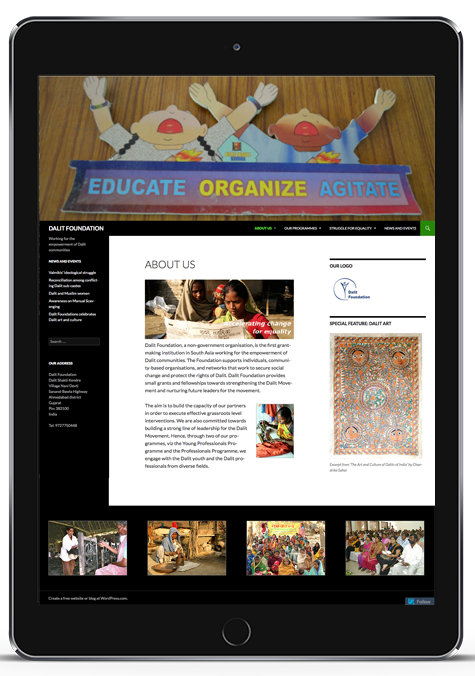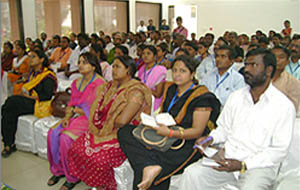Dalit Foundation (India)

About Us
The caste system, which has existed for more than 3000 years in India, is a traditional system of social segregation, which works on the principle of purity and pollution. The Dalits are placed at the bottom of this hierarchical ladder. Dalit Foundation is a non-governmental organisation and is the first grant-making institution in south Asia working for the empowerment of Dalit communities. Established in June 2003, the Foundation’s mission, vision and programme objectives focus exclusively on empowerment of Dalit communities. It is committed to support individuals, community-based organisations, and networks that work to secure social change and protect the rights of Dalits.
Dalit Foundation provides small grants and fellowships to individuals and organisations working among Dalits in India. The focus areas are combating caste violence, eradication of manual scavenging, leadership among Dalit women, rights over natural resources, health and education, social jsutice. The aim is to build the capacity of our partners in order to execute effective grass-root level interventions.
We are also committed towards building a strong line of leadership for the Dalit movement. Hence, through two further fellowship programmes, the Young Professionals Programme and the Professionals Programme, we engage with the Dalit youth and the Dalit professionals from diverse fields. Through these programmes the Dalit Foundation is not only strengthening the Dalit movement, but is also nurturing future leaders for the movement. In addition, Dalit Foundation also provides fellowships to dalit artists with the aim of promoting dalit art and culture and utilizing dalit culture as a tool for liberation.
Our board
Our board members are committed to the Dalit cause and come from a range of practice, activist and academic backgrounds. Their vision provides the direction for the local work and helps DF to network with a range of agencies and funders to support out work and share learning.

Our Work: The major Dalit Foundation programmes are:
GRANTS AND FELLOWSHIPS: Dalit Foundation provides small grants and fellowships to individuals and organisations working for the empowerment of Dalit communities at the grass-root level. Starting from supporting 6 projects and 9 fellowships in 2003-04, in 2007-08 we supported 36 projects and 85 fellowships and the work continues to grow.
YOUNG PROFESSIONALS PROGRAMME: The young professionals programme is a leadership building programme for Dalit youth. This two-year fellowship programme provides the young professionals with an opportunity to serve their communities and grow into sensitive leaders for the Dalit movement.
PROFESSIONALS PROGRAMME: Launched in 2007, the professionals programme is a fellowship programme awarded to individuals of Dalit community from the fields of medicine, engineering, journalism and law. The aim is to create homogeneity and sensitization among students about discrimination based on factors that violate constitutional tenets; Encourage students to express their concerns and attempt to influence national debates that are on subjects affecting their rights; Maintain contacts with outgoing students; and Act as a guide to students in their educational career.
DALIT ARTS AND CULTURE PROGRAMME: Dalit artists, time and again, face discrimination at one level or the other. Not only are they denied a platform to showcase their distinct art forms, but even when given an opportunity are side-lined by “popular art forms”. Dalit Foundation aims to promote and popularize Dalit art and provide a platform to Dalit artists to express themselves and make their culture visible. In order to fulfil this objective, the organisation provides fellowships to Dalit artists. In the pilot phase, three senior Dalit artists – two from the State of Bihar and one from Gujarat were awarded fellowships and provided capacity building trainings.
CAPACITY BUILDING WORKSHOPS FOR PARTNERS AND FELLOWS: Dalit Foundation has been working to provide all round support to its partners. As part of this role, the Foundation organizes workshops for its partners that will help them build on their capacity. The main objectives of the workshops are to provide various partners from all over India a platform to interact, to identify and address key issues concerning their work, to identify strategies that would resolve these issues, understand their expectations of Dalit Foundation, conducting sessions on basic accounts keeping etc.
Case Studies:
ORGANISATION SUPPORTED THROUGH ANNUAL GRANT: Men’s Institute of Development and Training (MIDT)
STATE: Ghaziabad District, Uttar Pradesh
ISSUES OF INTERVENTION: Eradication of Manual Scavenging
PROFILE
According to the United Nations Human Development Report, 2001, only 28 per cent of the Indian population has ‘sustainable access to improved sanitation’. The remainder of the population defecates in the open and in the absence of a scientific and efficient system of collection and disposal; the waste is removed manually. This work of disposal has been traditionally delegated on the basis of descent and birth to the most ‘polluted’ caste, that of the manual scavengers.
Manual Scavengers are also expected to clean sewage pits both private and public whereby the municipality itself employs them for the job. Several deaths of manhole workers are reported every year due to inhalation of poisonous gases such as carbon monoxide, hydrogen sulphide and methane that are formed in the sewers, or by drowning in the sewage. ‘Hidden Apartheid Caste Discrimination against India’s Untouchables’, a shadow report to the UN Committee on the Elimination of Racial Discrimination submitted by the Centre of Human Rights and Global Justice (New York School of Law) and the Human Rights Watch (New York), placed the count of such deaths at 100 per year.
Agriculture is the main occupation in the Bojpur Block of District Ghaziabad. However, the Scavenging community of the region owns no agricultural land, nor is any other ‘respectable’ sources of employment available to them. They (mainly the women) make their living as manual scavengers. To worsen the situation, they are deprived of government schemes and suffer from very low literacy rates. The community also is affected by evils such as superstition and alcoholism. Their constant contact with waste is adversely affecting their health. Tuberculosis, breathing disorders, backaches, stomach ailments, cholera, are common ailment in the community. The additional cost of the treatments adds a heavy burden on their meagre income. The strain of ill health and poverty has been leading to a steady decline in the average age. They are unaware of their rights and socially, economically and politically ignorant and backward.
MIDT under the aegis of Mr. Bhup Singh has been striving to improve the educational and health conditions of the scavenging community in the region, to organize them and to empower the women of the community. Since their association with Dalit Foundation, their work has spanned over 20 villages of the Bojpur block. They have been organizing legal workshops, awareness camps on human rights and training camps for developing leadership skills in women. They have also been carrying out training camps for Gram Panchayats (Village Councils) and have been disseminating information about Government Welfare Schemes. Their work has also resulted encouraging the community to seek alternative jobs. The milestone in their work was when they eradicated manual scavenging from seven villages of Ghaziabad, namely Nihali, Kasedi, Bhojpur, Joya, Dhuri, Bhadola and Dhathedi. Approximately 135 families who previously earned their living by manual scavenging have been impacted.
FELLOW SUPPORTED THROUGH ANNUAL GRANT: Ms Anita Suryavanshi
STATE: Bilaspur District, Chhattisgarh
ISSUES OF INTERVENTION: Empowerment of Dalit Women
PROFILE
Women among Dalits are doubly marginalized, facing discrimination not only on account of their lowly caste status but also their gender. Dalit women are abused, raped and harassed by men of all castes, even their own. Dalit Foundation concentrates on enhancement of women leadership. By channelling the contained desire within them to break the shackles of gender and caste bondage, we look to Dalit women to lead the Dalit Movement to its ultimate triumph.
Ms. Anita Suryavanshi is a young Dalit girl from Bilaspur district of Chattisgarh. Having had suffered many hardships during her childhood, Anita is a girl with strong convictions and determination to fight against injustice and atrocities committed against Dalits.
She has been striving to do away with untouchability and aid Dalit communities in availing development benefits such as opening bank accounts, availing widow pension, obtaining BPL ration cards and asserting their right to the stipulated minimum wage. Anita is also trying to propagate the ideology of caste and gender equality through workshops. She has also been helping people in lodging FIRs against cases of atrocities and discrimination against Dalits.
In one daring incident she took action against Sarpanch Shanker Lal of Chorbhatti Kala village who is responsible for numerous cases of atrocities against Dalits and has illegally acquired over 150 acre of land. Though cunning and deceit he has forced many Dalits into bonded labour to work on this land. To free them of their predicaments Anita appealed for land pattas for the bonded labourers to the tehsildar. While her appeals received no response, Lal and his allies threatened her with rape and murder if she pursued the case further. Resolute Anita however continued to fight and lodged an FIR against the perpetrator of the crime. Justice prevailed and they were made to pay a fine of Rs. 5000 each. However this angered them further and they tore down the boundary wall of her house, and reiterated their threats.
Website: www.dalitfoundation.net
Email: programmesdf2016@gmail.com
Email: governancedf2016@gmail.com
Address: Dalit Shakti Kendra, Village Nani Devti, Sanand-Bawla Highway, Ahmedabad district, Gujarat, Pin: 382100, India
Tel: 9727750448
Find us (nearby):


